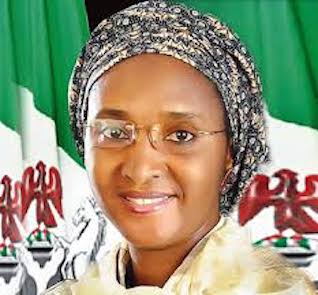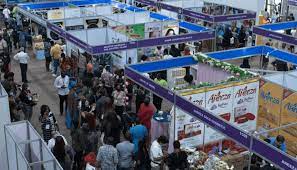Economy
FG Projects 50% Decline in Monthly Revenue Allocations

By Tony Obiechina, Abuja
Following significant drops in the global crude oil prices, the Federal Government on Monday projected that monthly revenue allocations to the three tiers of government may decline to below N400 billion, in the next three to six months.
This is against the N888.
Minister Finance, Budget and National Planning, Mrs Zainab Ahmed made the projections at a press conference while announcing government stimulus to ameliorate the COVID 19 pandemic.
She said based on the fiscal assumptions underpinning the 2020 Appropriation Act, monthly federation account (FAAC) disbursements to the federal and state governments were projected at N888.
The Minister however, explained that “due to the significant drop in international oil prices, FAAC monthly disbursements have declined in recent months to N716.3 billion in January and N647.4 billion in February and N581billion in March 2020”.
The Minister said, “Our experience shows that monthly FAAC receipts must average at least N650 billion for the federal and state governments to meet their current obligations. Unfortunately, we project that monthly receipts may decline to below N400 billion, over the next three to six months.”
According to her, “In order to address the emerging fiscal risks, Mr. President has given a number of approvals. He has approved that the sum of US$150 million be withdrawn from the Nigeria Sovereign Investment Authority (NSIA) Stabilisation Fund to support the June 2020 FAAC disbursement. The Stabilisation Fund was created for such emergencies and is to be utilised for this purpose.
“Mr. President has also approved that the Federal Ministry of Finance, Budget and National Planning should engage with the Central Bank of Nigeria (CBN) to agree on a debt and interest moratorium for states on federal government and CBN-funded loans, in order to create fiscal space for the states, given the projected shortfalls in FAAC allocations.
“Accordingly, once monthly average FAAC receipts fall below a specific threshold, interest and capital payments by states shall be suspended till monthly average FAAC receipts exceed the threshold. The details of this moratorium will be expeditiously worked out with a view to submitting the final proposals for Mr. President’s guidance and final approvals,” Ahmed stated.
In her words: “The intervention is vital to create fiscal space for the States, as they deal with the health and economic impact of the crisis. States will also be encouraged to explore similar arrangements on their outstanding debts to commercial banks”.
On ensuring adequate supplies of essential food items and critical medical supplies, as well as appropriate stewardship of donated items and funds, the Minister noted that the responses to the COVID-19 Pandemic and the impact of the 14-days’ lockdown would have a significant impact on the transportation, distribution and availability of essential food items and medical supplies.
According to her, the government recognises the adverse implications of these extraordinary measures for our market women, farmers, traders and smaller businesses.
Referring to the Finance Act, 2019, Ahmed said “The Finance Act, 2019 fortuitously provided significant tax relief for micro, small and medium-sized enterprises (MSMEs). Corporate tax rates for medium-sized enterprise were cut from 30 percent to 20 percent, and SMEs are completely exempt from corporate taxation.
“This tax relief will be invaluable for businesses in the large informal sector that earn N25 million or less in a financial year.
The Finance Act, 2019 has also expanded the value added tax (VAT) exemption list for essential food, medical supplies and other basic items that are critical in our efforts to address the COVID-19 pandemic.”
Acknowledging the contributions of public-spirited Nigerians towards the fight against the pandemic, the Minister said: “We deeply appreciate the overwhelming show of solidarity by public-spirited individuals and corporate bodies towards combating the COVID-19 pandemic through financial and material contributions.
” In this regard, the government recognises its responsibility to put an adequate framework in place for the collection, management and reporting of these donations. Accordingly, the Federal Ministry of Finance, Budget and National Planning has developed a comprehensive framework for the transparent management of the contributions.”
She said in the interim, “Mr. President has also approved the opening of five commercial bank accounts as transit accounts to the treasury single account (TSA)”.
This, according to her, is in order to better mobilise donations from the generality of the people and corporate bodies across the nation, create flexibility and make it easy for citizens that want to donate while maintaining the sanctity of the TSA.
She said, “Going forward, the COVID-19 donor accounts, which will form part of the existing TSA arrangement, have been opened with the following banks: Zenith bank, Access bank, Guaranty Trust bank, UBA; and First bank. “Other banks will be included in this initiative as the need arises. These accounts will be linked to the main TSA for ease of monitoring and reporting.
“Finally, we will be issuing circulars and Ministerial Orders to ensure that charitable donations by benevolent companies to support our COVID-19 pandemic efforts are tax deductible, in line with Section 25 of the Companies Income Tax Act”.
Also considering the place of the amendment of 2020 Appropriation Act, Ahmed said: “The 2020 Appropriation Act was based on certain fiscal assumptions, which we have been compelled to revisit, given the emerging economic realities.
“Specifically, projected oil revenues have been significantly affected in that: Dated Brent oil prices fell to as low as US$19.125/barrel (03.04.2020) as compared with the 2020 budget benchmark of US$57/barrel; and oil production in 2020 year-to-date is 1.9mbpd (before the current crises) as compared with the 2020 budget’s projection of 2.18mbpd.”
“We are therefore revising the benchmark oil price for 2020 to US$30/barrel and oil production to 1.7mbpd. We have similarly had to adjust downwards our non-oil revenue projections, including various tax and customs receipts, as well as proceeds of privatisation exercises.
“In this regard, the Budget Office is currently working on amendments to the medium-term expenditure framework (MTEP 2020-2022) and the 2020 Appropriation Act. The proposed amended budget will provide for the COVID-19 Crisis Intervention Fund and other adjustments required, due to the decline in international oil prices.
“We have also commenced consultations with the leadership and key Committees of the National Assembly to discuss our plans, such that once the Executive’s 2020 Amendment Budget is completed, we shall expeditiously seek presidential and legislative approvals for this revised appropriation”, she added.
Economy
Seplat Energy Pays $2bn Tax to FG in 10 Years

Seplat Energy, an independent indigenous energy company, on Tuesday, said it had paid two billion dollars tax contribution to the Federal Government of Nigeria since its listing on the Nigerian Exchange Ltd.(NGX) in 2014.
Mr Roger Brown, Chief Executive Officer(CEO), Seplat Energy, revealed this while delivering a speech at the Closing Gong ceremony in Lagos.
The event was to commemorate the company’s 10 years anniversary of dual listing on the Premium Board of the Nigerian EExchange Ltd.
(NGX) and the Main Market of the London Stock Exchange (LSE).Brown stated that the oil and gas company, Seplat, also contributed 2.8 billion dollars as tax to the federal government over the past 13 years, after its establishment in 2009.
He explained that the company paid 1.54 billion dollars as royalty to the government, 329 million dollars as Petroleum Profits Tax, 273 million dollars as Value Added Tax, and 259 million dollars as Witholding Tax.
According to him, the energy firm also paid a tax of 276 million dollars to the Nigerian Delta Development Commission (NDDC) and others as well as 126 million dollars as Pay-As-You-Earn(PAYE).
The CEO stated that at post Initial Public Offering(IPO) of the firm, it generated 1.7 billion dollars in Free Cash Flow(FCF) and invested 1.6 billion dollars in Capex.
He also said that the company had paid dividends worth 575 million dollars between 2014 when it became listed and the financial year ended 2023.
Brown noted that the business of the energy firm continued to generate strong cashflows, reflected in its strong FCF and NCFO generation.
He said: “Similarly, we have generated a cumulative 3.3 billion dollars in net operating cash flow post IPO.
“Our strong cash flow generation has supported our ambitions to expand our business, which has seen us spend an aggregate of 1.6 billion dollars in capital expenditure.
“In over 10 years, we invested 57 million dollars in community projects on health, education and empowerment as strong commitment to community development.
“As a leading supplier of gas to Nigeria’s domestic Gas-To-Power Market, at times Seplat gas powered 20 to 30 of Nigeria’s domestic grid in 2023.”
He expressed delight over the feat, reiterating Seplat Energy’s commitment to leading Nigeria’s energy transition.
According to him, the power of indigenous companies is to bring growth and prosperity to their home countries and the people.
“One example of how Seplat Energy is making an enduring difference to Nigeria and host communities where we operate is that nearly 50 million dollars had been invested by our Joint Venture partnerships in communities since our inception to date,” Brown said.
“Truly, Seplat Energy has delivered significant value by enhancing strategic, operational and financial achievements in 10 years as a listed company,” he added.
In his comments, Mr Temi Popoola, Chief Executive Officer (CEO), NGX Group, emphasised the significance of Seplat Energy’s decade of dual listing.
He said, “If we were to look back to our market and tried to find landmarks, the last major landmark you will find in the last ten years is this transaction that we are celebrating today, and the market is very grateful for that.”
Congratulating Seplat Energy on this milestone, in his welcoming remarks, Alhaji Umaru Kwairanga, NGX Group Chairman, highlighted the importance of partnerships between the NGX and companies like Seplat Energy in driving economic growth and development.
He stated that “Seplat’s journey symbolises resilience, innovation, and a commitment to excellence, making them a beacon of corporate governance and operational expertise.
“Seplat Energy has emerged as a leading indigenous energy company, deeply integrated into Nigeria’s economic landscape and the NGX Group remains committed to supporting companies like Seplat Energy as they drive economic growth and contribute to our nation’s prosperity.”
Reflecting on the significance of the decade of dual listing, Mr Udoma Udo Udoma, Board Chairman, Seplat Energy, remarked, “Seplat Energy is committed to driving Nigeria’s transition to sustainable and affordable energy, harnessing its power to improve lives by transforming the economy.
“We have ambitious goals. We are investing in Nigeria. We will support the federal government’s energy transition policy, and we will partner with FG in whatever area they want us to do.
“That is our commitment. We will grow Seplat while also maintaining the highest standard of corporate governance.”
Also commending Seplat Energy on the decade of listing, Mr Jude Chiemeka, Acting CEO, NGX, stressed the importance of the capital market in helping companies raise funds and create wealth for all.
Chiemeka said, “Seplat Energy was listed at N576 at listing and yesterday it closed at 3,370, which is an increase of over 484 per cent.
“The figures show that in the last 10 years, the company has paid out 575 million dollars in dividend payments to shareholders in Nigeria and London where they are also listed.
“So, this company has given investors a huge opportunity to really participate in wealth creation.
“Reports show that Nigeria would be among the top 20 countries in the next 25 years, and I think Seplat is poised to be one of the institutions driving growth, prosperity, and inclusion in our nation.”
Also, gracing the Closing Gong ceremony was Sen. Heineken Lokpobiri, Minister of State, Petroleum Resources (Oil), who commended the company on it laudable achievements.
“I am happy to be part of today’s celebration and Seplat’s exceptional performance in the last ten years and as Minister of State, Petroleum Resources,
“I assure you that we will partner with Seplat to expand their investments, not only for the benefit of its shareholders, but also for Nigeria.
“The least the government can do anywhere in the world is to create an environment where companies like Seplat continue to thrive.”(NAN)
Economy
34 States Shunned 35th Enugu Int’l Trade Fair

No Fewer than 34 states in the country failed to honour invitation to attend the just-concluded 35th Enugu International Trade Fair.
Reports says that only the Federal Capital Territory (FCT), Abuja; Ebonyi State and the host state, Enugu State, graced the 11-day international goods, services and idea showcasing fiesta.
The fair, which began on April 5 and ended on Monday, April 15, was themed: “Promoting made-in-Nigeria products for global competitiveness.
”Reacting, the Director-General of Enugu Chamber of Commerce, Mr Uche Mbah, said that the chamber followed due diligence in the invitation of all states to the fair.
Mbah noted that official letters were sent and official follow-up on the letters were made to ensure their presence and availability.
According to him, “we did everything to get them to add colour and increase the showcasing of products from different parts of the country and their investment viability.
“We did put in spirited efforts to see that all states participated, as most of them do previously.
“But it is unfortunate that many did not respond after receiving official letters, phone calls and interpersonal follow-ups were made.
“We got clear assurances from Kano State but they did not show up.
“We pushed harder to get Abia State but in the end, we were told that the governor did not approve,” he said.
Reports says that over 100 organisations were at the fair, which included: over 50 private companies as well as over 45 Federal and State government ministries, agencies and departments. (NAN)
Economy
Nigeria’s Inflation Hit 33.20% in March, says NBS

The National Bureau of Statistics (NBS) says Nigeria’s headline inflation rate increased to 33.20 per cent in March 2024.
The NBS said this in its Consumer Price Index (CPI) and Inflation Report for March, which was released in Abuja on Monday.
According to the report, the figure is 1.50 per cent points higher compared to the 31.
It said on a year-on-year basis, the headline inflation rate in March 2024 was 11. 16 per cent higher than the rate recorded in March 2023 at 22.04 per cent.
In addition, the report said, on month-on-month basis, the headline inflation rate in March 2024 was 3.02 per cent, which was 0.10 per cent lower than the rate recorded in February 2024 at 3.12 per cent.
“This means that in March 2024, the rate of increase in the average price level is less than the rate of increase in the average price level in February 2024.”
The report attributed the increase in the headline index for March 2024 on a year-on-year basis and month-on-month basis to increase in some goods and services at the divisional level.
It said these increases were observed in food and non-alcoholic beverages, housing, water, electricity, gas, and other fuel, clothing and footwear, and transport.
Others, it said, were furnishings, household equipment and maintenance, education, health, miscellaneous goods and services, restaurants and hotels, alcoholic beverage, tobacco and kola, recreation and culture, and communication.
It said the percentage change in the average CPI for the 12 months ending March 2024 over the average of the CPI for the previous corresponding 12-month period was 27.13 per cent.
“This indicates a 6.76 per cent increase compared to 20.37 per cent recorded in March 2023”, it said.
The report said the food inflation rate in March 2024 increased to 40.01 per cent on a year-on-year basis, which was 15.56 per cent higher compared to the rate recorded in March 2023 at 24.45 per cent.
“The rise in food inflation on a year-on-year basis is caused by increases in prices of Garri, Millet, Akpu (uncooked fermented, which are under bread and cereals class), Yam Tuber, and Water Yam.
“Others are Dried Fish Sadine, Mudfish Dried, Palm Oil, Vegetable Oil, Beef Feet, Beef Head, Liver, Coconut, Water Melon, Lipton Tea, Bournvita, and Milo”, NBS said.
It said on a month-on-month basis, the food inflation rate in March was 3.62 per cent, which was a 0.17 per cent decrease compared to the rate recorded in February 2024 at 3.79 per cent.
“The fall in food inflation on a month-on-month basis was caused by a decrease in the average prices of Guinea corn flour, Plantain Flour etc (under Bread and Cereals class); Yam, Irish Potato, and CocoYam.
“Others are Titus fish, Mudfish Dried, Lipton, Bournvita, and Ovaltine”, it said.
The report said that “all items less farm produce and energy’’ or core inflation, which excludes the prices of volatile agricultural produce and energy, stood at 25.90 per cent in March on a year-on-year basis.
“This increased by 6.26 per cent compared to 19.63 per cent recorded in March 2023.’’
“The exclusion of the PMS is due to the deregulation of the commodity by removal of subsidy.”
It said the highest increases were recorded in prices of bus journey within the city, actual and imputed rentals for housing, consultation fee of a medical doctor, etc.
The NBS said on a month-on-month basis, the core inflation rate was 2.54 per cent in March 2024.
“This indicates a 0.37 per cent increase compared to what was recorded in February 2024 at 2.17 per cent.”
“The average 12-month annual inflation rate was 22.26 per cent for the 12 months ending March 2024, this was 5.04 per cent points higher than the 17.22 per cent recorded in March 2023”, it said.
The report said on a year-on-year basis in March 2024, the urban inflation rate was 35.18 per cent, 12.11 per cent higher compared to the 23.07 per cent recorded in March 2023.
The report said on a year-on-year basis in March 2024, the rural inflation rate was 31.45 per cent, which was 10.37 per cent higher compared to the 21.09 per cent recorded in March 2023.
“On a month-on-month basis, the rural inflation rate was 2.87 per cent, which decreased by 0.20 per cent compared to February 2024 at 3.07 per cent’’, it said.
On states’ profile analysis, the report showed that in March, all items inflation rate on a year-on-year basis was highest in Kogi at 39.97 per cent, followed by Bauchi at 38.34 per cent, and Kwara at 38.10 per cent.
It, however, said the slowest rise in headline inflation on a year-on-year basis was recorded in Borno at 25.78 per cent, followed by Benue and Taraba at 28.12 per cent, and Katsina at 28.32 per cent.
The report, however, said in March 2024, all items inflation rate on a month-on-month basis was highest in Zamfara at 3.90 per cent, followed by Abia at 3.89 per cent, and Ondo at 3.75 per cent.
“Borno at 1.46 per cent, followed by Yobe at 1.84 per cent and Adamawa at 1.85 per cent recorded the slowest rise in month-on-month inflation”, NBS said.
The report said on a year-on-year basis, food inflation was highest in Kogi at 48.46 per cent, followed by Kwara at 46.18 per cent, and Akwa Ibom at 45.18 per cent.
“Nasarawa at 33.76 per cent, followed by Borno at 34.28 per cent and Bauchi at 34.38 per cent recorded the slowest rise in food inflation on a year-on-year basis’’, it said.
The report, however, said on a month-on-month basis, food inflation was highest in Abia at 5.17 per cent, followed by Cross River at 5.14 per cent, and Bayelsa at 4.75 per cent.
“Cross River stood at 1.59 per cent, followed by Yobe at 2.08 per cent and Adamawa at 2.12 per cent, recorded the slowest rise in inflation on a month-on-month basis”, it said. (NAN)





















